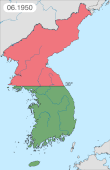Observers (1948–1991)
On 12 December 1948, the Republic of Korea was officially recognized by the UN General Assembly (UNGA) under Resolution 195. [1] [a] From that point, South Korea participated in the GA as an observer.
Both South Korea and North Korea applied for membership in the UN in 1949, but no action was taken on their applications at that time as the Soviet Union opposed the admission of South Korea. [2]
In June 1950, North Korea invaded South Korea, and the Korean War commenced. The UN Security Council denounced the invasion, and "recommended that Members of the United Nations furnish such assistance to the Republic of Korea as may be necessary to repel the armed attack and to restore international peace and security in the area," and "that all Members providing military forces and other assistance...make such forces and other assistance available to a unified command under the United States of America," and authorized this new United Nations Command "at its discretion to use the United Nations flag in the course of operations against North Korean forces..." [3] Sixteen nations responded by sending combat troops (and five other countries sent humanitarian aid) to support South Korea. The Soviet Union, a veto-wielding power, was absent and failed to prevent the UN resolution, [4] having been boycotting proceedings since January 1950 in protest that the Republic of China and not the People's Republic of China held a permanent seat on the council. [5] The Council President at the time was Norwegian Arne Sunde. [6]
Coming with change of recognition in 1971 of the Chinese seat, North Korea also gained observer status in 1973. [2]
As the Cold War came to a close, South Korea announced in 1991 that it would seek its own membership in the UN. [7] North Korea had previously opposed separate membership in the UN for itself and South Korea because it opposed the permanent recognition of "two Koreas". [7] However, with no prospect of a Chinese or Soviet veto of South Korea's bid, North Korea announced that it would also seek UN membership, stating that North Korea "has no alternative but to enter the United Nations at the present stage" to avoid having "important issues related to the interests of the entire Korean nation [being] dealt with in a biased manner on the U.N. rostrum." [7] South Korea's Foreign Ministry welcomed North Korea's application, saying that separate memberships for the two Koreas would "greatly contribute to easing tension ... and also facilitate the process of peaceful reunification." [7] The UN Security Council unanimously recommended both North Korea and South Korea for membership, with the two countries being admitted on 17 September 1991. [2]








